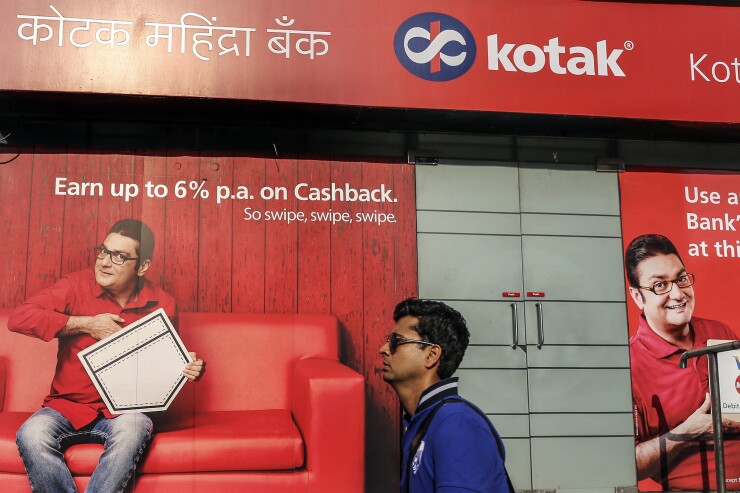At least one winner has emerged from India’s crackdown on so-called black money: the country’s richest banker.
Uday Kotak, billionaire chairman of Kotak Mahindra Bank Ltd., is reaping broad benefits as the government’s efforts to withdraw the biggest bills from circulation pushes savings into the formal financial sector -- including his group’s banking, insurance, brokerage services and asset management businesses.
Kotak’s personal fortune has surged by 43 percent this year to $10.1 billion, according to the Bloomberg Billionaires Index, compared with a jump of 22 percent for the S&P BSE Sensex Index. The 22 Indian billionaires on the index of the world’s 500 richest people have increased their fortunes 32 percent since Jan. 1.

Average assets under management jumped about 61 percent in a year at the group’s investment manager, while the lender’s non-performing loans remain well below the industry average, helping make his bank one of the top gainers on the Sensex this year. Profits at the brokerage and insurance units of Kotak also rose due to the shift of investments into financial assets. He’s also trying to draw clients with a new banking app called 811 -- after the Nov. 8 date on which Prime Minister Narendra Modi announced his demonetization policy.
“The financial sector has benefited because informal finance has become formal," he said in a phone interview from Mumbai. “But in addition to banking, we are seeing even faster growth in asset management. Former financial savings are flowing significantly into financial assets."
Kotak says that demonetization aimed at fighting corruption and counterfeiting, and other economic reforms by Modi are directing money that was previously in cash, savings or real estate toward the kind of financial assets offered by his bank.
Kotak’s 811 app has helped rein in clients from the hordes of Indians forced to give up cash. His Mumbai-based lender reached 60.8 billion rupees ($947.6 million) in mobile transactions in June, a 115 percent increase from the year before. Reserve Bank of India data showed 1.9 trillion rupees of mobile banking transactions in May.
While Kotak Mahindra said in its 2016-2017 annual report that demonetization caused a short-term decrease in growth for tractor loans and financing against gold, it also saw a jump in credit card issuance and current account deposits. Indians deposited most of their big bills by the deadline for handing over the old bank notes last year.
The banker said India’s financial sector is reaching a “tipping point" as private sector banks gain market share in lending from state-owned banks saddled with non-performing loans. Kotak Mahindra has a bad loan ratio of about 2.6 percent as of June 30. Reserve Bank of India showed an average banking sector average of 9.6 percent as of March 31.
Kotak sold a stake in his bank worth about $261 million in May after the Reserve Bank of India directed the company to gradually reduce the promoters’ holding to 15 percent by March 2020 in line with guidelines for bank licenses. Kotak sold shares in March as well and currently has about 12 percent of his net worth in cash or investable assets, according to the Bloomberg index.
“At this point in time, we continue to remain in convertible financial assets and we have not got any immediate plans on any strategic move," he said of his cash position.





